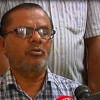A symptom of the disease
The headmaster of a school in Narayanganj was humiliated about twos weeks ago. If that sounds like the beginning of a Kafkaesque short story, it comes close. It was a cringe-inducing moment, at once surreal and jarring. A headmaster was being publicly punished though there were no formal charges against him, no substantive or procedural due process had been followed, no evidence of wrongdoing presented, and no law-enforcement agencies involved. This was a rather brazen display of audacity and arrogance on the part of an MP, and clearly indicative of the famous "culture of impunity" that characterises Bangladesh today.
When Sir Edmund Hillary was asked why he had undertaken the incredible challenge to climb Mt. Everest, he had responded, "Because it is there". Similarly, if our MPs are asked why they did, or said, or decided on something, they can easily respond, "Because we can" (with the clear implication that they can get away with it).
Teachers have habitually been afforded a position of respect and admiration that few other professions can claim. The sentiment is universal, long-standing and deep. Perhaps it is no longer true. And, that is the crux of the problem. Things that used to matter to us, no longer do. Traditions that had been sanctified over time, now can be dismissed with disdain. Actions that would be considered inconceivable earlier, are now passé. This is emblematic of the political culture we have fashioned for ourselves. Public humiliation is now part of political theatre. The tamasha of politics has now been transformed into the politics of tamasha.
It is easy to condemn the MP. But, this incident also demands some self-interrogation. Have we all not contributed to the creation of this moment? Are we all not complicit in generating the enabling environment in which such actions become possible and, in some ways, perhaps inevitable? Have we not become inured to the violations of law, custom and morality, to an extent where they do not mean much anymore? Aren't the problems this incident has exposed, and the questions it has generated, much more fundamental and troubling?
Does it not reveal an environment of distrust and disrespect that afflicts the entire body politic, a gradual weakening of our social structures, the erosion of the values of decency and fairness, and the dismantling of the norms and customs that have sustained us, and perhaps defined us? Who can we look up to, which body can we trust, what ethical system can we use to distinguish right from wrong? Where are the icons that exemplify our virtue, courage and honour? What legacies, lessons and inspirations, do we see around us? The moral landscape is, admittedly, rather bleak.
The Parliament, through its multiple responsibilities of legislation, representation, oversight and public education, is supposed to ensure and reflect the importance of good governance and democratic order. But is the current body, having come about through a process that may have been constitutionally valid but politically questionable, fulfilling its role? And what standards do the MPs set? Isn't the honour and integrity of their position sometimes compromised by the personal conduct of some, the language used by others (sometimes even in the floor of the House), and their willingness to display their power through flouting of laws? Doesn't the action of this MP insult the very institution he represents, or is he merely its ugly and exaggerated embodiment?
Can we look to our political leadership for direction and guidance? But do they not display a cynical and opportunistic aptitude for shape-shifting in order to pursue short-term interests? Do they not thrive on rhetorical hyperbole and bullying tactics, on sycophancy and pandering, on money and mastans? Do they not create a hyper-polarised partisan atmosphere through presenting grotesque caricatures of each other (thus one is either a Pakistani razakar or an Indian dalal, an unenlightened mullah or a decadent secularist, an opponent of our independence or an enemy of our religion)? What real alternatives do they present?
Do our public servants always behave in ways that reassure the confidence of the people? Physical and verbal assaults are routinely inflicted on others (sometimes by a minister, a Thana Nirbahi administrator, a police officer, or local goons acting at the behest of the powerful). Political vendettas can be carried out through deploying the instruments of the State including the legal system. Law enforcing agencies often break the law, and are hardly ever held accountable for their transgressions.
Didn't this perception of lawlessness in some ways lead the MP to assume the role of prosecutor, judge, jury, and executioner? Couldn't the members of the school board follow established rules, couldn't the mosque authorities inform the police, couldn't the MP instruct the people to let justice take its course? None of this happened, because few of them had any trust in the legal system, or in the moral compass of the nation.
Moreover, a whisper, an innuendo, a suggestion is enough to agitate the public. The fundamental principle behind the rule of law is that a person is innocent unless proven guilty. Is that being honoured? How can the sanctity of law, or the spirit of democracy, be maintained when people are afraid of being accused of causing offense (against a faith, or the PM, or the Parliament, or the judicial system, or the military, or the spirit of the liberation war or historical issues surrounding it, and so on), and be subjected to vigilante justice? How can freedom of speech flourish when sensitivities are so high, and public patience so low, when dissent is considered dangerous, any critique is considered to be a challenge, and all opposition is viewed as an existential threat that must be crushed? How credible are the preachy platitudes about democracy coming from people who are not its best exemplar?
Even the private sector has lost its previous lustre. This not only refers to some well-known "scandals" (Landmark, Destiny, Basic Bank, Stock Exchange, and so on), but the practice of the super-rich to exploit workers and put them in harm's way, evade taxes, send their money abroad in dodgy deals and shady arrangements, and flaunt their newly found (and often ill-gotten) wealth in conspicuous consumption with a vengeance. They demand deference only because they can buy it.
And finally, by doubling down, refusing to apologise, and proclaiming that he will do anything to defend his faith, has the MP not affronted that very faith by donning the mantle of being its saviour (given his boorish demeanour, his profane language, his cruel actions)? Is his behaviour consistent with the message of Islam with its emphasis on tolerance, mercy and justice? Is he protecting Islam, or using it to protect himself?
The MP's behaviour offers a metaphor for our times. His gesture of defiance and contempt is like an upraised middle finger thrust into the face of the entire nation. And how will we respond? There will be some shaking of heads and gnashing of teeth. Some statements will be issued. Some brave young men and women will try to express their protest and outrage. But ultimately, nothing will happen to him. He has friends both in high and low places. His party will not expel him, the Parliament will not censure him, and his constituency, due to intimidation or manipulation, will not abandon him. That is the real shame of Bangladesh, and its tragedy.
The writer is Professor Emeritus, Black Hills State University, USA. Email: [email protected]

 For all latest news, follow The Daily Star's Google News channel.
For all latest news, follow The Daily Star's Google News channel. 







Comments